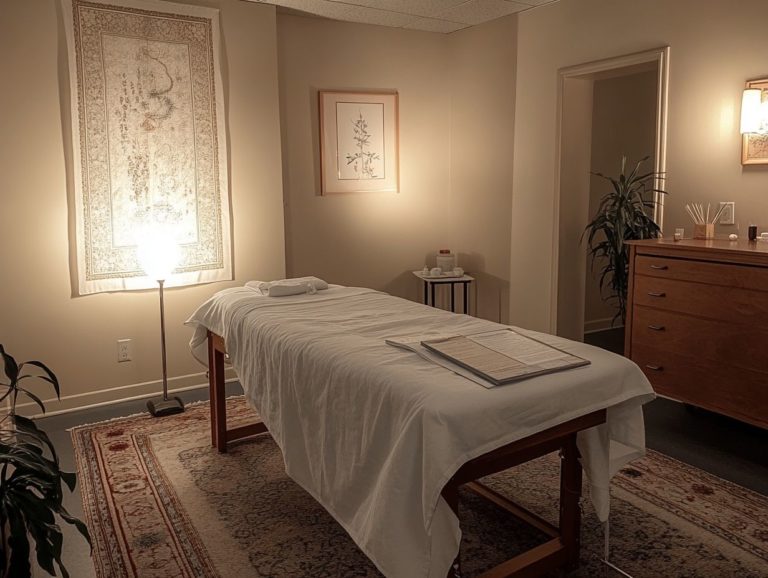How to Choose an Alternative Medicine Practitioner?
Alternative medicine presents a holistic approach to health and wellness, integrating diverse practices and philosophies that cater to your unique needs.
As your interest in these alternatives expands, it becomes increasingly important for you to make informed choices when selecting a practitioner. This article will delve into the various types of alternative medicine available, essential qualifications to seek, key questions to pose to potential practitioners, and tips for assessing their credentials.
By the end of your reading, you’ll be well-equipped to make decisions that resonate with your health goals and personal preferences.
Contents
- Key Takeaways:
- Understanding Alternative Medicine
- What to Look for in an Alternative Medicine Practitioner
- Experience and Specialties
- Questions to Ask Before Choosing a Practitioner
- Researching and Evaluating Practitioners
- Making the Final Decision
- Frequently Asked Questions
- What is alternative medicine?
- How do I know if alternative medicine is right for me?
- What qualifications should I look for in an alternative medicine practitioner?
- How can I find a reputable alternative medicine practitioner?
- What to Consider When Choosing an Alternative Medicine Practitioner
- Can I Combine Alternative and Traditional Medicine?
- How to Find a Reputable Alternative Medicine Practitioner
- Choosing the Right Specialist
Key Takeaways:

Research and evaluate alternative medicine practitioners through online reviews, personal referrals, and consultations to find one with the necessary qualifications, experience, and specialties. For more guidance, learn how to find reliable resources on alternative medicine.
Ask questions about a practitioner’s background, approach to treatment, cost, and insurance coverage to ensure they align with your personal preferences and comfort level.
Collaborate with your chosen practitioner to create a personalized treatment plan that takes into account your specific needs and goals.
Understanding Alternative Medicine
Understanding alternative medicine means recognizing its valuable role in healthcare as a complement to conventional treatments. Alternative medicine offers exciting healing methods that can transform your health.
This approach includes a range of healing methods like acupuncture, herbal medicine, and energy healing, all designed to enhance patient care and improve overall wellness.
With more cancer patients exploring integrative health options, alternative medicine emerges as a crucial component of holistic care. By emphasizing mind-body connections and patient preferences, health professionals can craft personalized treatment plans that address not just physical symptoms but also emotional health, enriching the broader perspective of health and well-being.
Types of Alternative Medicine
Types of alternative medicine are remarkably diverse, encompassing practices such as acupuncture, Ayurveda, traditional Chinese medicine, naturopathic medicine, yoga, and biofeedback. Each modality presents unique therapeutic benefits that cater to a wide array of health conditions and personal preferences.
Take acupuncture, for example. It employs fine needles to stimulate specific points on your body, promoting energy flow and alleviating pain especially effective for chronic conditions. Similarly, yoga combines physical postures, breathing techniques, and meditation to nurture both your physical and emotional well-being.
By weaving these practices into your daily routine, you ll likely discover that you can relieve symptoms. You may also enhance your overall quality of life. Alternative therapies often work hand-in-hand with conventional medicine, fostering a holistic approach that enables you to take an active role in managing your health.
The principles in these practices remind us to address both the body and mind on our wellness journey.
What to Look for in an Alternative Medicine Practitioner
When seeking an alternative medicine practitioner, it s essential for you to evaluate their qualifications and certifications, along with their experience and specialties in integrative medicine.
This diligence ensures you receive safe, effective, and personalized care that aligns with your unique health needs, especially when managing chronic conditions or exploring complementary therapies.
Qualifications and Certifications
Qualifications and certifications serve as essential markers of competence in alternative medicine, often signifying a comprehensive training process in integrative medicine or specific alternative practices.
These certifications can vary widely, covering a range of disciplines such as acupuncture, herbal medicine, and holistic nutrition, among others. Enrolling in accredited programs is crucial, as they ensure you possess not only theoretical knowledge but also practical skills that meet established standards.
Such qualifications are essential for building trust in patient care, assuring clients that you are adept at addressing diverse health concerns while promoting both safety and effectiveness in treatment.
Don t wait! Begin your journey into alternative medicine today and discover a new path to vibrant health.
Experience and Specialties
Experience and specialties shape how effective an alternative medicine practitioner can be. This is especially true when addressing specific health conditions like cancer or chronic illnesses.
Practitioners with extensive knowledge in areas like acupuncture or herbal medicine can create tailored approaches for your needs. This customization is crucial because individual health issues often require specialized treatments that standard methods may overlook.
Patients often feel more satisfied when practitioners understand their conditions, building trust in the process.
By engaging with targeted treatment methods, practitioners can elevate patient outcomes, ensuring that both physical and emotional needs are thoroughly addressed.
Questions to Ask Before Choosing a Practitioner
Asking the right questions before selecting an alternative medicine practitioner is crucial for ensuring a perfect fit for your unique health needs and treatment preferences.
Key inquiries to consider include:
- Their background
- Their approach to treatment
- How they seamlessly integrate alternative methods with conventional medicine
Background and Approach to Treatment

Understanding your practitioner s background and treatment methods is essential for building trust. When you feel comfortable with their beliefs, it creates a healing environment.
Aligning treatment philosophies with your health values enables you to take an active role in your care. It also ensures that the therapies you choose resonate with your unique needs.
For example, if you prioritize holistic approaches, you may experience greater satisfaction and improved outcomes when your practitioner emphasizes integrative methods that blend traditional and alternative practices.
This alignment can significantly influence the therapeutic process, leading to a more personalized and successful care experience tailored just for you.
Cost and Insurance Coverage
Cost and insurance coverage are essential considerations when selecting an alternative medicine practitioner, as they can greatly affect your access to various treatment options.
Inquire not only about the fees associated with treatments but also explore the potential for reimbursement through your health insurance plans.
Many insurance providers have begun to recognize the benefits of complementary and alternative medicine (CAM), offering partial coverage for certain therapies. It s wise to thoroughly investigate your policy, as some may cover:
- Acupuncture
- Chiropractic services
- Herbal therapies
This can ease financial burdens and make healing options more accessible. Ask practitioners about payment plans or sliding scale options to accommodate different budgets.
Researching and Evaluating Practitioners
Researching and evaluating alternative medicine practitioners is crucial for making informed decisions regarding your healthcare.
Gathering information from online reviews, personal referrals, and initial consultations helps you identify qualified providers who align perfectly with your therapeutic needs.
This proactive approach enables you to make choices that enhance your well-being.
Online Reviews and Recommendations
Online reviews and recommendations are invaluable tools for assessing alternative medicine practitioners. They offer insights into their methods, effectiveness, and patient satisfaction.
Interpreting these reviews demands a critical mindset. Many can be subjective, influenced by personal experiences and emotions, which may distort the true capabilities of a practitioner.
It s vital to look for overall trends in feedback rather than fixating on isolated comments, as consistent patterns can reveal reliability.
Maintain a healthy skepticism toward overly positive or negative sentiments, as biases whether intentional or not can shape reviews. To cultivate a well-rounded perspective, seek unbiased recommendations from trusted sources in addition to online opinions.
Personal Referrals and Consultations
Personal referrals and consultations play a crucial role in evaluating alternative medicine practitioners. They provide invaluable firsthand insights into their practices and patient care styles.
Recommendations from trusted friends, family, or health professionals can enhance your understanding of a practitioner’s approach. This helps you make a more informed choice and feel comfortable.
Scheduling an initial consultation allows you to assess the practitioner’s communication style, philosophy, and overall compatibility. This assessment is essential for achieving your desired health outcomes.
By prioritizing these steps, you can navigate the often-overwhelming landscape of alternative medicine with greater confidence. This ensures a supportive partnership that aligns with your personal health values and fosters a positive healing experience.
Making the Final Decision
Choosing an alternative medicine practitioner requires thoughtful consideration of your personal preferences and comfort levels. These elements are vital in shaping your therapeutic journey and enhancing your overall experience.
Considering Personal Preferences and Comfort Level
Your personal preferences and comfort level are crucial when selecting an alternative medicine practitioner. These factors greatly impact both your experience and treatment outcomes.
To navigate this important decision, reflect on your health beliefs and values. Consider the types of treatments that resonate with you or those that make you feel uneasy. Your past experiences with healthcare providers can provide insights; recalling interactions that felt supportive or dismissive can guide your future choices.
Take time to contemplate which approaches speak to you whether it’s holistic therapies, acupuncture, or herbal medicine. This contemplation can help you forge a more meaningful connection with your practitioner.
This introspection not only assists in pinpointing your comfort zones but also significantly enhances the likelihood of achieving positive treatment results.
Creating a Treatment Plan with the Practitioner

Creating a treatment plan with an alternative medicine practitioner is vital for ensuring a structured approach to achieving your health goals and managing your symptoms. This collaborative process involves a thorough assessment of your unique health history while emphasizing your personal preferences and overall lifestyle.
Engaging in open dialogue allows you and your practitioner to explore various types of treatments, including:
- Acupuncture
- Herbal medicine
- Mindfulness techniques
Together, you can consider how each treatment can complement your existing medical approaches. This personalized plan will perfectly align with your unique health needs and boost your well-being! Additionally, integrating tools like nutritional guidance and physical therapies creates a holistic approach, ensuring that every aspect of your health is taken into account.
Frequently Asked Questions
What is alternative medicine?
Alternative medicine refers to healing practices that fall outside of conventional Western medicine. These may include herbal remedies, acupuncture, massage therapy, and other non-traditional treatments.
How do I know if alternative medicine is right for me?
Alternative medicine can be beneficial for various health conditions. However, consulting with a healthcare professional before incorporating it into your treatment plan is important. They can help determine if alternative medicine is a safe and effective choice for your specific needs.
What qualifications should I look for in an alternative medicine practitioner?
Research and find a practitioner who is properly trained and certified in their specific field of alternative medicine. Look for credentials accredited by reputable organizations, such as the National Certification Commission for Acupuncture and Oriental Medicine.
How can I find a reputable alternative medicine practitioner?
You can start by asking for recommendations from friends, family, or your primary care physician. Research online and read reviews from previous patients. Another option is to contact professional organizations in the specific field of alternative medicine you are interested in.
Start your journey towards better health today by exploring alternative medicine options!
What to Consider When Choosing an Alternative Medicine Practitioner
Look for a doctor who has the right experience and a treatment style that suits you. It’s essential to choose someone who listens to your concerns and makes you feel comfortable.
Can I Combine Alternative and Traditional Medicine?
Yes, you can often use alternative medicine alongside traditional treatments. Always talk to your primary care doctor first to ensure compatibility with your current medications.

How to Find a Reputable Alternative Medicine Practitioner
Start by asking friends, family, or your primary care doctor for recommendations. You can also read online reviews or contact professional organizations in the field you re interested in.
Choosing the Right Specialist
Make sure to research practitioners who are properly trained and certified. Look for credentials from respected organizations like the National Certification Commission for Acupuncture and Oriental Medicine.






